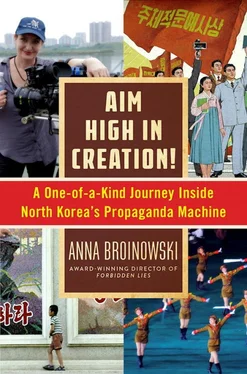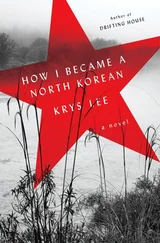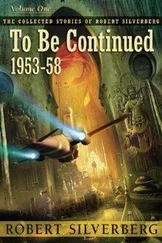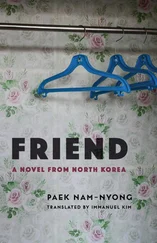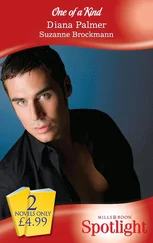“Thank you for coming, sensei,” I say, and he waves me away, chuffed.
“Come here,” he says to the actors, and they assemble at his feet. Pak pulls out a well-thumbed copy of my script, speaking gently to Ms. Yun: “Karen is a gardener. She loves nature. She wants to preserve it for her daughter. You must have this love deep inside your heart.” Ms. Yun nods. She’s been studying the role for weeks now. She gave me her take on it earlier today, in Kim Jong Il’s feudal Korean film set. Beijing tourists dressed in Yi Dynasty robes were posing for photos, and a Pyongyang bride in a meringue wedding gown stood under a parasol with her groom for a formal portrait. When it started to rain, we moved Ms. Yun into an antechamber next to the temple to continue her interview.
The chamber contained an incongruously springy red couch and bamboo wallpaper. Ms. Yun didn’t seem fazed. “Karen has a mother’s softness, but is as strong as a lion when fighting the evil deeds of big business,” she began—and a trapdoor concealed in the wallpaper slid open. Two heavily made-up women, in leopard-print blouses and tight metallic skirts, peered out. They stared at the famous Ms. Yun, too starstruck to be embarrassed. They were obviously working girls, and the couch Ms. Yun was perched on was—as far as I could tell—where they plied their trade. Ms. Yun continued the interview as if the sex workers weren’t there, and I followed suit, wondering if they serviced the studio’s filmmakers—maybe even Pak himself. Perhaps the women were not embarrassed at all, but simply surprised by our intrusion. If the Koreans are anything like the Japanese, paid sex is a completely pragmatic activity, with none of the guilt-laden hang-ups still clinging to it in the West. Like so many other things I’ve encountered here, the only thing I was sure about was that I couldn’t discuss it out loud.
Back on the Swiss chalet steps, Pak is busy humiliating Ri Yon Chol. “Comrade, you’re playing the evil miner, but you look like a really bad guy already—so don’t overdo it,” he instructs, making the other actors laugh. Ri Yon Chol glowers with displeasure and lights a fag. “Hey, Anna, your casting ability is pretty poor, if you chose this actor based on his looks,” Pak continues—and I want to leap to Ri Yon Chol’s defence. I’ve seen him beating up communist workers as a gold-encrusted gangster in Seoul and sneaking into the Yankees’ barracks on the DMZ to betray his comrades. Ri Yon Chol is brilliant. It’s not his fault that he looks like a thug—underneath, he’s probably as sensitive as the other actors, and just as keen for approval.
“I have to say, sensei, that I like Ri Yon Chol very much” is all I can manage, with my substandard Japanese. But I let Pak know that I mean it.
“Well then, Ri Yon Chol will prove you wrong in a minute,” Pak says cheerfully and springs to his feet. “First, the lovers!” He herds Miss N and Mr. Lee to a stone path beside the chalet. Ms. Yun settles in the soft grass to watch, and Ri Yon Chol slinks into the shadows to study the Inner West Argus . Pak lights a new cigarette, watching Miss N practising tae kwon do in her high-heeled sandals. Each time she kicks, her khaki skirt billows above her thighs. “Hey, Anna,” Pak calls. “If you’re going to film something like this, do it low angle, so the audience won’t be disappointed!” He mimes putting the camera underneath Miss N’s skirt. She blushes and keeps on kicking. I’m too stunned to respond. Pak quickly waves his hand in the air, brushing the joke away. “Comrade Lee,” he says, serious now, “you are Mitch, the awakened hero. Just like the playboy in our masterpiece Myself in the Distant Future , Mitch learns through the love of a devoted worker’s daughter the error of his ways—and becomes a hero for the village.” Mr. Lee nods and nervously stands in position.
“Action!” Pak snaps, and Mr. Lee saunters up to Miss N with exaggerated cool.
“Where are you from?” she asks him, continuing to practise her tae kwon do.
“I came from the North. You won’t understand because you’re not a comrade engineer,” Lee replies, reaching out to touch her face. Then he stops, awkward with nerves. Miss N giggles.
“How do I—” Lee starts to ask—but Pak has already leapt in to demonstrate. “Don’t approach her like a heinous criminal,” he upbraids the embarrassed Lee. “Even in Europe, they don’t do that. Do it as if you’re yawning.” Pak stretches his arms over his head, expertly letting one hand come to rest on Miss N’s neck. “Doing it like this is art. Not the sleazy way you did it. Again!”
Lee repeats the scene, stretching clumsily and bumping Miss N on the nose. They burst out laughing, and Pak darkens with anger. “Stop!” he yells. “Do you think this is funny? How can you do a good job, with such an attitude? Comrade N: run around the building. Run to the hills and come back. Go! Now! Run!”
Miss N gathers up her skirt and runs off, as fast as her high heels will carry her. The others look on calmly. Pak turns to me, petulant: “She’s only saying the lines. She’s not acting from her body. An actor should act , for God’s sakes.” Pak smokes and sulks, until Miss N sprints back, red with sweat. “Go! Go into the scene!” yells Pak—and this time, they nail it. Mr. Lee brushes Miss N’s hair off her face with seductive ease, and she grabs his wrist, punches him in the stomach, and sends him flying to the ground. “Good,” says Pak, and saunters off. The young actors bow deeply, expressing their heartfelt thanks to his retreating back.
If Pak and Ri are anything to go by, being Commander of the Creative Group means being a bit of a dickhead, I decide. Nic raises her eyebrows at me—she’s thinking the same thing. But Pak surprises us. He ushers Ms. Yun and Ri Yon Chol over to the grassy hill for their scene, and his entire demeanour changes. He plucks some wildflowers and places them delicately in Ms. Yun’s hands, as if she’s made of porcelain. “Pretend these are the sign you’ve made against coal seam gas,” he whispers. “Action.”
Ms. Yun turns to Ri Yon Chol, full of pain: “You work for us, but you take our money overseas. When our land is empty, you will run away —”
“STOP!” interjects Pak, and Ms. Yun blushes. “Anna, Comrade Yun is a kind person. She’s only ever played nice ladies,” he explains, “so it’s hard for her to be angry.”
I look at Ms. Yun: “Do you have children?” She nods, and I suggest she imagines the gas mine is making them sick.
“Yes, be really angry,” Pak agrees. “Western emotions are different from ours: they are more overblown.” It’s an unusual observation, given the melodrama and sentimentality of North Korean movies. Then again, what’s overblown to the North Koreans could be understated to us, and vice versa.
Pak stands beside Ms. Yun, their backs to the camera. “Imagine someone has died,” he whispers, touching her arm. And suddenly, he starts to bounce up and down in the grass. “Squat and stand repeatedly twenty times,” he orders. Ms. Yun does what she’s told. We watch the two of them, bouncing up and down with the energy of teenagers. “This is connecting the body and the emotion!” pants Pak, waiting for Ms. Yun to finish. “Action!”
Ms. Yun spins around to Ri Yon Chol, her eyes flashing with rage: “We have to live with the destroyed land in sadness and in pain!”
Ri Yon Chol’s mouth twists into a sly smile: “The gas we’re extracting is not harmful.”
Ms. Yun quivers, her beautiful eyes dissolving in tears: “Thousands of our townspeople will rise up against you!” Ri Yon Chol gazes calmly at the meadow, the softly bleating goats. “Where are they?”
Читать дальше
